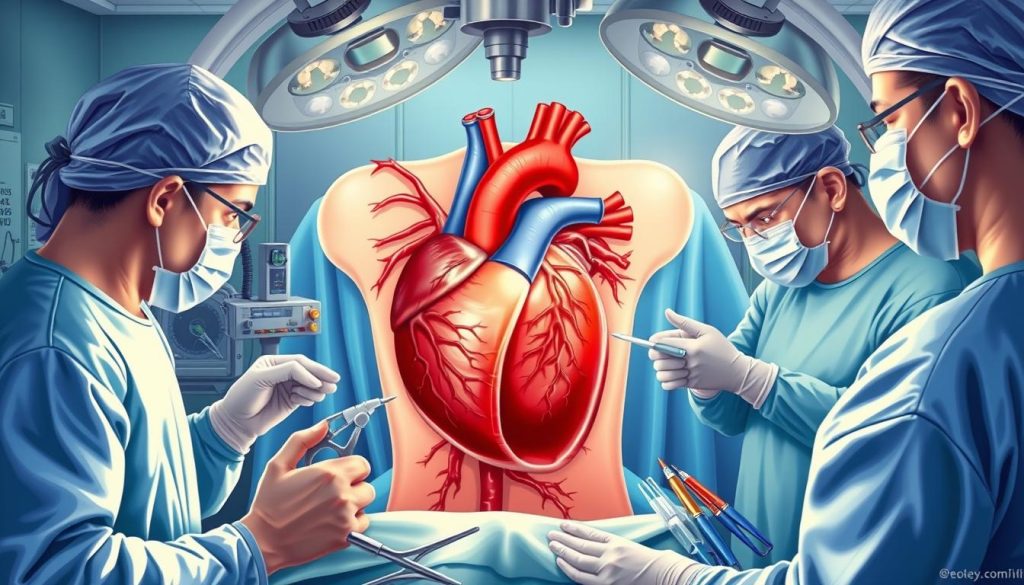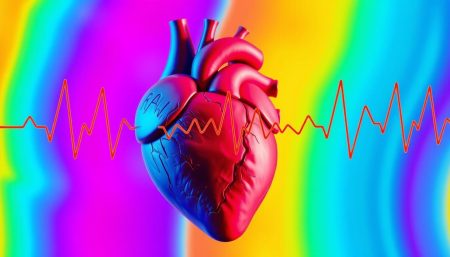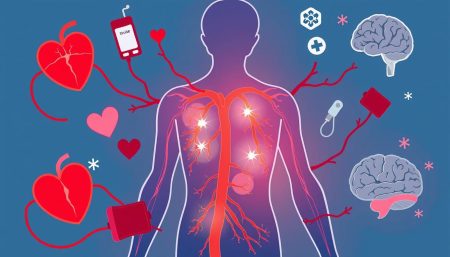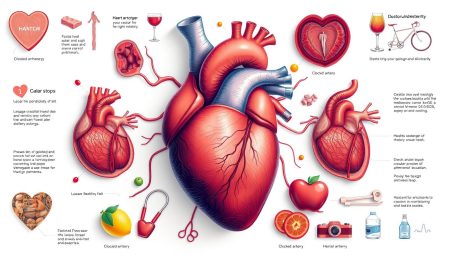Heart health is key to feeling good. Millions suffer from cardiovascular disease, but there’s a way to fight back. This guide will show you how to reverse it, with tips on making lifestyle changes.
We’ll look at diet changes and exercise plans that work. Our aim is to give you the tools to improve your heart health. You might even be able to reverse heart disease.
Join us on this path to better heart health. We’ll explore simple yet effective lifestyle changes. These can greatly improve your heart’s health.
Understanding Cardiovascular Disease and Its Impact on Health
Cardiovascular disease affects millions worldwide, making heart disease prevention key. It impacts the heart and blood vessels, causing serious health problems. Knowing the risk factors and warning signs is vital for early detection and treatment.
Types of Cardiovascular Conditions
Cardiovascular conditions vary, each affecting different heart and circulatory system parts. Common types include:
- Coronary artery disease
- Heart valve disease
- Arrhythmias
- Heart failure
- Peripheral artery disease
Risk Factors and Warning Signs
Knowing risk factors is essential for preventing heart disease. Some common risk factors include:
| Modifiable Risk Factors | Non-Modifiable Risk Factors |
|---|---|
| High blood pressure | Age |
| High cholesterol | Gender |
| Smoking | Family history |
| Obesity | Ethnicity |
Warning signs of cardiovascular issues include chest pain, shortness of breath, irregular heartbeat, and fatigue. Recognizing these symptoms early can save lives.
Global Statistics and Prevalence
Cardiovascular disease is a leading cause of death worldwide. In the United States, it causes about 1 in every 4 deaths. This highlights the need for heart disease prevention strategies and managing risk factors effectively.
“Cardiovascular disease is responsible for 31% of all global deaths, making it the number one cause of death worldwide.”
How to Reverse Cardiovascular Disease Through Lifestyle Changes
Reversing cardiovascular disease is possible with dedicated lifestyle changes. Heart health improvement starts with small, consistent changes in daily habits. These adjustments can lead to significant cardiovascular disease reversal over time.

A heart-healthy diet is the foundation of effective lifestyle changes. Eat whole plant-based foods, rich in fiber and antioxidants. Cut down on processed foods, saturated fats, and added sugars. This can greatly improve your cholesterol and blood pressure.
Regular exercise is key for reversing cardiovascular disease. Aim for at least 150 minutes of moderate-intensity aerobic activity or 75 minutes of vigorous-intensity aerobic activity weekly. Activities like brisk walking, swimming, or cycling can strengthen your heart and improve circulation.
“Small steps lead to big changes. Every healthy choice you make is a step towards reversing heart disease.”
Stress management is vital for heart health improvement. Add relaxation techniques like deep breathing, meditation, or yoga to your daily routine. These practices can lower blood pressure and reduce heart-related complications.
Quitting smoking and limiting alcohol are essential lifestyle changes. Both habits increase the risk of cardiovascular problems. Seek support from healthcare professionals or support groups to overcome these challenges.
| Lifestyle Modification | Impact on Heart Health |
|---|---|
| Plant-based diet | Lowers cholesterol and blood pressure |
| Regular exercise | Strengthens heart and improves circulation |
| Stress management | Reduces blood pressure and heart strain |
| Quitting smoking | Decreases risk of heart attack and stroke |
Remember, reversing cardiovascular disease is a journey. Consistency in these lifestyle changes is key to long-term heart health improvement.
The Power of Plant-Based Nutrition in Heart Health
Switching to a plant-based diet can greatly benefit your heart. It focuses on eating foods that are good for your heart and body. These foods help protect your heart and blood vessels.
Essential Heart-Healthy Foods
Eat lots of colorful fruits and vegetables. Leafy greens, berries, and citrus fruits are full of antioxidants. Whole grains, legumes, and nuts are rich in fiber and healthy fats. These foods are key to a diet that fights inflammation.
| Food Group | Examples | Heart Health Benefits |
|---|---|---|
| Leafy Greens | Spinach, Kale, Collards | Rich in nitrates, lowering blood pressure |
| Berries | Strawberries, Blueberries | High in antioxidants, reducing inflammation |
| Whole Grains | Oats, Quinoa, Brown Rice | Fiber-rich, improving cholesterol levels |
| Legumes | Lentils, Chickpeas, Black Beans | Plant protein source, supporting heart health |
Anti-inflammatory Diet Principles
An anti-inflammatory diet helps lower heart disease risk. Stay away from processed foods, refined sugars, and too much salt. Eat foods rich in omega-3s like flaxseeds and walnuts. Turmeric and ginger add flavor and help fight inflammation.
Meal Planning for Cardiovascular Health
Plan meals around plant-based proteins and complex carbs. Begin with oatmeal and berries for breakfast. Lunch could be lentil soup with whole-grain bread. Dinner might be a colorful stir-fry with tofu and veggies. Snack on nuts or fruit to stay energized all day.
Exercise Strategies for Heart Disease Reversal
Physical activity is key to reversing heart disease. A good exercise plan can make your heart stronger and improve blood flow. It also boosts your heart health. Let’s look at ways to add heart-healthy exercises to your daily life.

Aerobic exercises are at the heart of cardiac rehab. They make your heart beat faster and help it work better. Walking, swimming, and cycling are great for beginners. Try to do 30 minutes of moderate exercise most days.
Strength training is also important for heart health. It builds muscle, which can lower your heart rate and blood pressure. Start with light weights and get stronger over time.
“Regular physical activity for heart health is like a daily dose of medicine for your cardiovascular system.”
Flexibility exercises, like stretching and yoga, are also beneficial. They improve blood flow, reduce stress, and make you feel better. Add them to your routine after exercising.
Before starting an exercise plan, talk to your doctor. They can make a program that fits your needs and health. Many hospitals have cardiac rehab programs that include exercise and heart-healthy tips.
Being consistent is important. Begin slowly and gradually do more. With effort, you’ll see big improvements in your heart health and life quality.
Managing Stress for Optimal Heart Function
Stress management is key to keeping your heart healthy. Using effective methods can lessen stress’s impact on your heart. This improves your overall health and well-being.
Meditation and Mindfulness Techniques
Mindfulness helps calm your mind and body. Regular meditation can lower blood pressure and heart rate. Start with deep breathing or guided visualizations to begin your mindfulness journey.

Sleep Quality and Heart Health
Good sleep is vital for heart health. Bad sleep habits can increase stress and heart issues. Aim for 7-9 hours of sleep each night. Create a calming bedtime routine and stick to a sleep schedule to better your sleep.
Stress Reduction Activities
Doing activities that reduce stress is great for your heart. Here are some ideas:
- Yoga or tai chi
- Regular exercise
- Spending time in nature
- Pursuing creative hobbies
- Connecting with friends and family
Add these activities to your daily life. They help manage stress and improve heart health.
| Stress Management Technique | Benefits for Heart Health | Recommended Frequency |
|---|---|---|
| Meditation | Lowers blood pressure, reduces heart rate | 10-15 minutes daily |
| Quality Sleep | Reduces stress hormones, improves heart function | 7-9 hours nightly |
| Exercise | Strengthens heart muscle, reduces stress | 30 minutes, 5 days a week |
By adding these stress management techniques to your life, you can greatly improve your heart health and overall well-being.
Natural Supplements and Remedies for Heart Health
Looking into natural remedies and supplements for heart health can be a great step. Many people use these options to help their heart health, along with traditional treatments. Let’s explore some popular choices backed by science.

Omega-3 fatty acids in fish oil are known for protecting the heart. They can lower triglycerides and reduce inflammation. Coenzyme Q10 (CoQ10) is also popular for improving heart function and energy in heart cells.
Herbal remedies like garlic and hawthorn have been used for heart health for centuries. Garlic may lower blood pressure and cholesterol. Hawthorn is thought to make the heart muscle stronger. But, it’s key to use natural remedies carefully and with a doctor’s advice.
- Magnesium: Supports heart rhythm and blood pressure regulation
- L-arginine: May improve blood flow and artery function
- Green tea extract: Contains antioxidants that support heart health
Alternative therapies like acupuncture and yoga may also help. They can manage stress and boost heart health. These practices can add to your overall heart wellness plan.
“Nature itself is the best physician.” – Hippocrates
While natural supplements and remedies are helpful, they shouldn’t replace doctor’s orders. Always talk to your doctor before starting any new supplement or therapy for your heart.
Medical Treatments and Interventions
When lifestyle changes aren’t enough, medical treatments are key. Doctors use many tools to help patients with heart disease. This includes medications and even heart surgery.
Medications and Their Effects
Cardiovascular medications are often the first choice. They can lower blood pressure and cholesterol, and prevent blood clots. You might take statins, beta-blockers, or ACE inhibitors.
Each type of medication works in its own way. They help protect your heart and blood vessels.
| Medication Type | Purpose | Common Side Effects |
|---|---|---|
| Statins | Lower cholesterol | Muscle pain, liver damage |
| Beta-blockers | Reduce heart rate and blood pressure | Fatigue, cold hands and feet |
| ACE inhibitors | Lower blood pressure | Dry cough, dizziness |
Surgical Options
In severe cases, heart surgery is needed. Procedures like CABG and angioplasty can improve blood flow. These surgeries can save lives for those with blocked arteries.

Emerging Treatments
New treatments for the heart are always coming. Stem cell therapy and gene therapy might repair damaged heart tissue. New, less invasive surgeries are making recovery faster.
These new approaches offer hope for better heart care. Your doctor can help choose the best treatment for you.
“The future of heart disease treatment lies in personalized medicine. We’re moving towards tailored therapies based on a patient’s genetic makeup and specific heart condition.”
Cardiology is always getting better, thanks to research. This means new options for heart disease patients. Your doctor can guide you to the right treatment.
Monitoring and Tracking Heart Health Progress
It’s important to keep an eye on your heart health to manage cardiovascular disease. Regular monitoring helps you and your doctor make better decisions about your care.
Key Health Markers to Watch
There are several important markers for heart health:
- Blood pressure
- Cholesterol levels (LDL, HDL, triglycerides)
- Body Mass Index (BMI)
- Fasting blood glucose
- C-reactive protein (inflammation marker)
Using Technology for Heart Health
Technology has changed how we monitor heart health. Smartwatches and fitness trackers can track heart rate and detect irregular beats. They can even do basic ECGs. Some devices connect to apps on your phone, letting you track your progress and share it with your doctor.
Regular Check-up Schedule
It’s key to have a regular schedule for check-ups. Your doctor might suggest:
| Check-up Type | Frequency | Importance |
|---|---|---|
| Blood pressure check | Every 6 months | Detect hypertension early |
| Cholesterol panel | Yearly | Assess heart disease risk |
| Stress test | As recommended | Evaluate heart function |
| Echocardiogram | Every 1-2 years | Examine heart structure |
By regularly checking these markers and going to check-ups, you can see how your heart health is improving. This helps you make changes to your treatment plan as needed.
Building a Support System for Recovery
Recovering from heart disease is easier with others by your side. A strong support system can greatly aid your healing. Heart disease support groups offer a safe space to share and learn from others.
Emotional support is key during recovery. Family and friends can offer encouragement and help with daily tasks. It’s okay to lean on them during this time.
Open communication about your needs and feelings can strengthen these relationships. This can improve your overall well-being.
Recovery networks go beyond personal connections. Hospitals and community centers have programs for heart disease patients. These networks offer resources, educational materials, and chances to connect with others.
“Joining a support group was a game-changer for me. It helped me realize I wasn’t alone in my struggles and gave me hope for the future.”
Online forums and social media groups for heart health are also helpful. They’re great for those with limited mobility or living far away. These platforms offer 24/7 support and information from a global community.
| Support Type | Benefits | Examples |
|---|---|---|
| In-person support groups | Face-to-face interaction, local resources | Hospital-based groups, community centers |
| Online forums | 24/7 access, global community | HeartNET, American Heart Association forums |
| Family and friends | Emotional support, practical help | Meal preparation, transportation to appointments |
Building a support system takes time. Be patient and open to trying different types of support. Your recovery journey is unique, and so is your support system.
Long-term Maintenance and Prevention Strategies
Keeping your heart healthy is a lifelong journey. After making positive changes, it’s important to keep them up for good heart health. Eat a balanced diet with lots of fruits, veggies, and whole grains. Stay active with fun exercises like walking, swimming, or dancing.
Regular check-ups are key for heart disease prevention. See your doctor every year to check your blood pressure, cholesterol, and more. These visits can catch problems early, making them easier to fix. Also, manage stress with relaxation techniques or hobbies you enjoy.
Small steps can lead to big results in heart health. Track your progress and celebrate small wins to stay motivated. Join support groups or find someone to share your journey with. By making heart-healthy choices daily, you’re investing in a healthier, happier future.
FAQ
Q: Can cardiovascular disease really be reversed?
A: Yes, you can reverse cardiovascular disease with lifestyle changes and proper care. This includes eating right, exercising regularly, managing stress, and sometimes, medical help. While full reversal isn’t always possible, you can see big improvements in heart health.
Q: What are the most effective dietary changes for heart health?
A: For heart health, eat more fruits, veggies, whole grains, and legumes. Cut down on saturated fats and trans fats. Also, limit sodium and boost omega-3s. These changes can greatly improve your heart health.
Q: How much exercise is needed to improve heart health?
A: Adults should do at least 150 minutes of moderate aerobic activity weekly. Or, 75 minutes of vigorous aerobic activity. Add muscle-strengthening activities two days a week for best heart health.
Q: What role does stress management play in reversing heart disease?
A: Stress management is key in reversing heart disease. Chronic stress can lead to high blood pressure and unhealthy habits. Try meditation, deep breathing, yoga, or regular exercise to reduce stress and improve heart health.
Q: Are there any natural supplements that can help reverse heart disease?
A: Some natural supplements can support heart health. Omega-3s, coenzyme Q10, garlic, and plant sterols are good examples. But, always talk to a healthcare provider before starting any supplements.
Q: How long does it take to see improvements in heart health?
A: Seeing heart health improvements can take time. It depends on your changes and how far you’ve come. Some may see blood pressure and cholesterol changes in weeks. But, reversing heart disease fully often takes months to years of effort.
Q: What are the key health markers to monitor for heart disease reversal?
A: Watch your blood pressure, cholesterol levels, triglycerides, blood sugar, BMI, and waist size. Regular check-ups with your doctor can track these and show your heart health progress.
Q: Can medications alone reverse heart disease?
A: Medications are important for heart disease management but aren’t enough alone. They work best with lifestyle changes. A mix of diet, exercise, stress management, and medical care is best for heart health.
Q: How important is sleep for heart health?
A: Sleep is vital for heart health. Bad sleep can raise blood pressure, obesity, and diabetes risks. Aim for 7-9 hours of quality sleep each night for heart health and overall well-being.
Q: What support resources are available for people working to reverse heart disease?
A: Many resources help, like cardiac rehab, support groups, workshops, and heart health apps. Hospitals and community centers offer programs for heart health improvement. Working with a healthcare team provides personalized support and guidance.


















